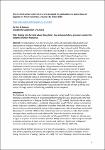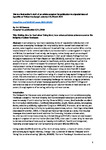Making time for food when ‘doing time’; how enhanced status prisoners counter the indignity of prison foodways
| dc.contributor.author | Parsons, Julie Milroy | |
| dc.date.accessioned | 2019-11-18T16:30:38Z | |
| dc.date.accessioned | 2020-06-18T11:30:24Z | |
| dc.date.issued | 2020-03 | |
| dc.identifier.issn | 0195-6663 | |
| dc.identifier.issn | 1095-8304 | |
| dc.identifier.other | 104507 | |
| dc.identifier.uri | http://hdl.handle.net/10026.1/15767 | |
| dc.description.abstract |
In contemporary neo-liberal societies, forms of responsible individualism and approaches to everyday foodways that reify healthy home-cooked food prepared from scratch, eaten together around a table are imbued with high cultural capital. What are the implications of this for criminalised individuals incarcerated in a prison system in England and Wales, that works with extremely low budgets, makes heavy use of pre-packaged convenience food and serves food to prisoners in their cells? Indeed, findings from Her Majesty's Inspectorate for Prison Report on food (2016:13), claims that ‘the quantity and quality of the food provided [in prison] is insufficient, and the conditions in which it is served and eaten undermine respect for prisoners’ dignity’, which they argue has implications in terms of increasing the marginalisation and alienation of the prison population from the ‘free community’. In this paper I draw on data from 39 in depth interviews at a resettlement scheme in England, conducted with 18 prisoners released on temporary licence from the resettlement wing of a closed and segregated Category C male prison. The enhanced status of prisoners and the benefits of being on the resettlement wing affords opportunities in relation to everyday foodways not available to regular prisoners. Their narrative accounts of prison foodways exemplify some of the HMIP findings and demonstrate how an enhanced prisoner status can counter notions of food as threat and poison, through systems of bartering, solidarity and recompense. | |
| dc.format.extent | 104507-104507 | |
| dc.format.medium | Print-Electronic | |
| dc.language | en | |
| dc.language.iso | en | |
| dc.publisher | Elsevier BV | |
| dc.relation.replaces | http://hdl.handle.net/10026.1/15159 | |
| dc.relation.replaces | 10026.1/15159 | |
| dc.relation.replaces | 10026.1/15711 | |
| dc.relation.replaces | http://hdl.handle.net/10026.1/15711 | |
| dc.subject | Sociology of food | |
| dc.subject | Identity | |
| dc.subject | Prison foodways | |
| dc.subject | Contamination | |
| dc.subject | Culture | |
| dc.subject | Symbolic capital | |
| dc.title | Making time for food when ‘doing time’; how enhanced status prisoners counter the indignity of prison foodways | |
| dc.type | journal-article | |
| dc.type | Journal Article | |
| dc.type | Research Support, Non-U.S. Gov't | |
| plymouth.author-url | https://www.webofscience.com/api/gateway?GWVersion=2&SrcApp=PARTNER_APP&SrcAuth=LinksAMR&KeyUT=WOS:000532260400002&DestLinkType=FullRecord&DestApp=ALL_WOS&UsrCustomerID=11bb513d99f797142bcfeffcc58ea008 | |
| plymouth.volume | 146 | |
| plymouth.publication-status | Published | |
| plymouth.journal | Appetite | |
| dc.identifier.doi | 10.1016/j.appet.2019.104507 | |
| pubs.merge-from | 10026.1/15711 | |
| pubs.merge-from | http://hdl.handle.net/10026.1/15711 | |
| plymouth.organisational-group | /Plymouth | |
| plymouth.organisational-group | /Plymouth/Faculty of Arts, Humanities and Business | |
| plymouth.organisational-group | /Plymouth/REF 2021 Researchers by UoA | |
| plymouth.organisational-group | /Plymouth/REF 2021 Researchers by UoA/UoA20 Social Work and Social Policy | |
| plymouth.organisational-group | /Plymouth/Research Groups | |
| plymouth.organisational-group | /Plymouth/Research Groups/Institute of Health and Community | |
| plymouth.organisational-group | /Plymouth/Users by role | |
| plymouth.organisational-group | /Plymouth/Users by role/Academics | |
| dc.publisher.place | England | |
| dcterms.dateAccepted | 2019-10-31 | |
| dc.rights.embargodate | 2020-11-3 | |
| dc.identifier.eissn | 1095-8304 | |
| dc.rights.embargoperiod | Not known | |
| rioxxterms.versionofrecord | 10.1016/j.appet.2019.104507 | |
| rioxxterms.licenseref.uri | http://www.rioxx.net/licenses/all-rights-reserved | |
| rioxxterms.licenseref.startdate | 2020-03 | |
| rioxxterms.type | Journal Article/Review |



